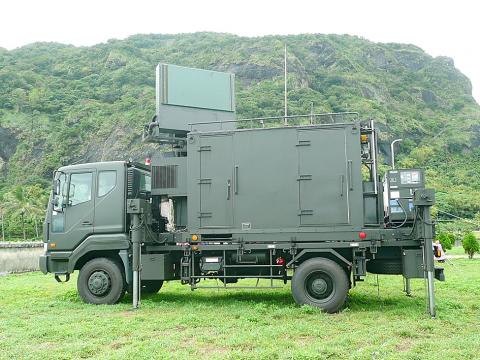As the Chinese People’s Liberation Army Air Force (PLAAF) deploys J-20 stealth fighters in increasing numbers, Taiwan is fielding mobile passive radar systems to defend its airspace against stealth aircraft, a senior Ministry of National Defense official said.
Two radar units — developed by the ministry-affiliated Chungshan Institute of Science and Technology — would be deployed some time this year for operational testing, the officials said on condition of anonymity.
The system would enter mass production in 2020 if the military decides that it meets its operational needs, he said.

Photo copied from the Chungshan Institute of Science and Technology’s Web site
The institute has been working for years to incorporate Western military technological trends in its mobile passive radar system, the official added.
The military’s concept for counter-stealth air defense is comprised of active and passive systems, which would detect, track and lock on to stealth targets at long range, the official said.
The active means would consist of upgraded F-16 warplanes, which have advanced radar systems capable of detecting stealth aircraft, he said, referring to F-16V aircraft and the APG-83 Scalable Agile Beam Radar.
The radar systems would comprise the passive end of the system, the official said.
The mobile units will be remotely linked to active phased array radar systems and “magnify” the radar cross-section of detected objects without emitting radiation, he said.
They are less vulnerable to electronic warfare interference and anti-radiation missile attacks, a fact sheet published by the institute said.
China claims that the J-20, its indigenous stealth strike fighter, performs on a par with the US’ F-22 Raptor, the official said, adding that the jet is likely capable of attacking targets at sea.
The radar systems are a response to the threat posed by Chinese stealth fighters, including its modified Su-35 fighters, which the PLAAF has been coating with radiation-absorbing paint to give them a measure of stealth, he said.
While the J-20 is in limited service, there is no doubt that the PLAAF will increase the size of its stealth fighter fleet and supplement it with other warplanes, which would pose a significant threat to Taiwan’s air defense, he said.
“These developments will erode the detection range of our advanced warning radar systems or even lead to the complete loss of advanced warning and quick reaction capabilities,” he said. “The military must plan for and deploy countermeasures to preempt them.”
The PLAAF on Friday last week dispatched formations of Su-35 fighters and H-6K bombers to fly around Taiwan, the first time that the former was sent on such a patrol.
The Chinese military claims that the J-20 has been deployed in air combat drills at sea.

INVESTIGATION: The case is the latest instance of a DPP figure being implicated in an espionage network accused of allegedly leaking information to Chinese intelligence Democratic Progressive Party (DPP) member Ho Jen-chieh (何仁傑) was detained and held incommunicado yesterday on suspicion of spying for China during his tenure as assistant to then-minister of foreign affairs Joseph Wu (吳釗燮). The Taipei District Prosecutors’ Office said Ho was implicated during its investigation into alleged spying activities by former Presidential Office consultant Wu Shang-yu (吳尚雨). Prosecutors said there is reason to believe Ho breached the National Security Act (國家安全法) by leaking classified Ministry of Foreign Affairs information to Chinese intelligence. Following interrogation, prosecutors petitioned the Taipei District Court to detain Ho, citing concerns over potential collusion or tampering of evidence. The

‘FORM OF PROTEST’: The German Institute Taipei said it was ‘shocked’ to see Nazi symbolism used in connection with political aims as it condemned the incident Sung Chien-liang (宋建樑), who led efforts to recall Democratic Progressive Party (DPP) Legislator Lee Kun-cheng (李坤城), was released on bail of NT$80,000 yesterday amid an outcry over a Nazi armband he wore to questioning the night before. Sung arrived at the New Taipei City District Prosecutors’ Office for questioning in a recall petition forgery case on Tuesday night wearing a red armband bearing a swastika, carrying a copy of Adolf Hitler’s Mein Kampf and giving a Nazi salute. Sung left the building at 1:15am without the armband and apparently covering the book with a coat. This is a serious international scandal and Chinese

Seventy percent of middle and elementary schools now conduct English classes entirely in English, the Ministry of Education said, as it encourages schools nationwide to adopt this practice Minister of Education (MOE) Cheng Ying-yao (鄭英耀) is scheduled to present a report on the government’s bilingual education policy to the Legislative Yuan’s Education and Culture Committee today. The report would outline strategies aimed at expanding access to education, reducing regional disparities and improving talent cultivation. Implementation of bilingual education policies has varied across local governments, occasionally drawing public criticism. For example, some schools have required teachers of non-English subjects to pass English proficiency

TRADE: The premier pledged safeguards on ‘Made in Taiwan’ labeling, anti-dumping measures and stricter export controls to strengthen its position in trade talks Products labeled “made in Taiwan” must be genuinely made in Taiwan, Premier Cho Jung-tai (卓榮泰) said yesterday, vowing to enforce strict safeguards against “origin laundering” and initiate anti-dumping investigations to prevent China dumping its products in Taiwan. Cho made the remarks in a discussion session with representatives from industries in Kaohsiung. In response to the US government’s recent announcement of “reciprocal” tariffs on its trading partners, President William Lai (賴清德) and Cho last week began a series of consultations with industry leaders nationwide to gather feedback and address concerns. Taiwanese and US officials held a videoconference on Friday evening to discuss the